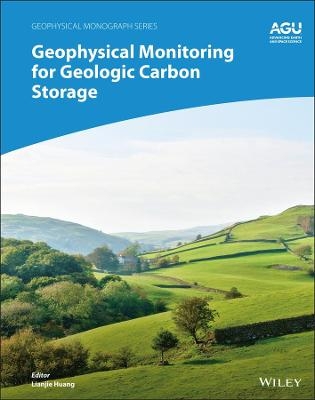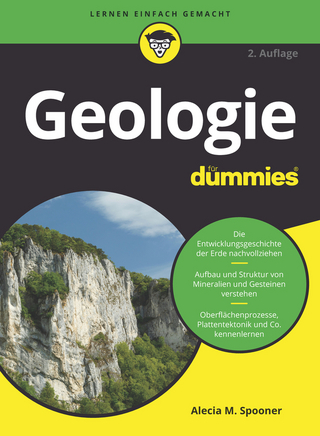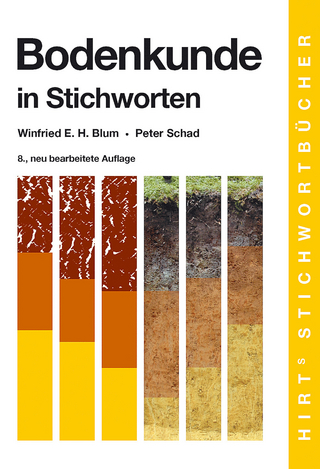
Geophysical Monitoring for Geologic Carbon Storage
American Geophysical Union (Verlag)
978-1-119-15683-3 (ISBN)
Storing carbon dioxide in underground geological formations is emerging as a promising technology to reduce carbon dioxide emissions in the atmosphere. A range of geophysical techniques can be deployed to remotely track carbon dioxide plumes and monitor changes in the subsurface, which is critical for ensuring for safe, long-term storage.
Geophysical Monitoring for Geologic Carbon Storage provides a comprehensive review of different geophysical techniques currently in use and being developed, assessing their advantages and limitations.
Volume highlights include:
Geodetic and surface monitoring techniques
Subsurface monitoring using seismic techniques
Subsurface monitoring using non-seismic techniques
Case studies of geophysical monitoring at different geologic carbon storage sites
The American Geophysical Union promotes discovery in Earth and space science for the benefit of humanity. Its publications disseminate scientific knowledge and provide resources for researchers, students, and professionals.
Lianjie Huang, Los Alamos National Laboratory, USA.
List of Contributors vii
Preface xi
1 Evaluating Different Geophysical Monitoring Techniques for Geological Carbon Storage
Lianjie Huang and Xianjin Yang 1
Part I Geodetic and Surface Monitoring
2 Geodetic Monitoring of the Geological Storage of Greenhouse Gas Emissions
Donald Vasco, Alessandro Ferretti, Alessio Rucci, Giacomo Falorni, Sergey Samsonov, Don White, and Magdalena Czarnogorska 11
3 Surface Monitoring, Verification, and Accounting (MVA) for Geologic Sequestration Storage
Samuel Clegg, Kristy Nowak-Lovato, Robert Currier, Julianna Fessenden, and Ronald Martinez 29
Part II Subsurface Seismic Monitoring
4 Optimal Design of Microseismic Monitoring Network for Cost-Effective Monitoring of Geologic Carbon Storage
Ting Chen and Lianjie Huang 43
5 Seismic Response of Fractured Sandstone During Geological Sequestration of CO2: Laboratory Measurements at Mid (Sonic) Frequencies and X-Ray CT Fluid Phase Visualization
Seiji Nakagawa and Timothy Kneafsey 53
6 Dynamic Moduli and Attenuation: Rhyolite and Carbonate Examples
Daniel Delaney, Christopher Purcell, Alan Mur, Igor Haljasmaa, Yee Soong, Dustin Crandall, and William Harbert 73
7 Elastic-Wave Sensitivity Propagation for Optimal Time-Lapse Seismic Survey Design
Kai Gao, Huseyin Denli, Xuefeng Shang, and Lianjie Huang 93
8 Time-Lapse Offset VSP Monitoring at the Aneth CO2-EOR Field
Zhifu Zhang and Lianjie Huang 125
9 Reverse Time Migration of Time-Lapse Walkaway VSP Data for Monitoring CO2 Injection at the SACROC CO2-EOR Field
Yi Wang, Hui Huang, and Lianjie Huang 145
10 Least-Squares Reverse-Time Migration for Reservoir Imaging at the Cranfield CO2-EOR Field
Sirui Tan, Lianjie Huang, and Thomas M. Daley 155
11 Quantifying Changes of Subsurface Geophysical Properties Using Double-Difference Seismic-Waveform Inversion
Youzuo Lin, Zhigang Zhang, and Lianjie Huang 167
12 Multicomponent Seismic Data and Joint Inversion
Bryan DeVault, Vincent Clochard, Lee H. Spangler, and David W. Bowen 179
13 Tracking Subsurface Supercritical CO2 Using Advanced Reflection Seismic and Well Log-Based Workflows Incorporating Fluid Density and Pore Pressure Effects: Relevance to Reservoir Monitoring and CO2 EOR
Alan Mur, Thomas M. Daley, and William Harbert 197
Part III Subsurface Nonseismic Monitoring
14 Monitoring Carbon Storage Sites With Time-Lapse Gravity Surveys
Delphine Appriou and Alain Bonneville 213
15 Fundamentals of Electrical and Electromagnetic Techniques for CO2 Monitoring
Erika Gasperikova and H. Frank Morrison 233
16 Monitoring Geologic Carbon Sequestration Using Electrical Resistivity Tomography
Xianjin Yang and Charles Carrigan 255
17 Monitoring of Large-Scale CO2 Injection Using CSEM, Gravimetric, and Seismic AVO Data
Svenn Tveit and Trond Mannseth 273
18 Self-Potential Monitoring for Geologic Carbon Dioxide Storage
Yuji Nishi and Tuneo Ishido 303
Part IV Case Studies of Geophysical Monitoring
19 Microseismic Monitoring, Event Location, and Focal Mechanisms at the Illinois Basin-Decatur Project, Decatur, Illinois, USA
Robert A. Bauer, Robert Will, George El-Kaseeh, Paul Jaques, Sallie Greenberg, and Michael Carney 323
20 Associated Storage With Enhanced Oil Recovery: A Large-Scale Carbon Capture, Utilization, and Storage Demonstration in Farnsworth, Texas, USA
Robert Balch and Brian McPherson 343
21 Testing Geophysical Methods for Assessing CO2 Migration at the SECARB Early Test, Cranfield, Mississippi, USA
Susan D. Hovorka 361
22 Toward Quantitative CO2 Monitoring at Sleipner, Norway
Anouar Romdhane, Bastien Dupuy, Etor Querendez, and Peder Eliasson 383
23 Geophysical Monitoring of CO2 Injection at Ketzin, Germany
Peter Bergmann, Magdalena Diersch, Julia Gotz, Monika Ivandic, Alexandra Ivanova, Christopher Juhlin, Juliane Kummerow, Axel Liebscher, Stefan Lüth, Sjef Meekes, Ben Norden, Cornelia Schmidt-Hattenberger, Florian Wagner, and Fengjiao Zhang 403
24 Geophysical Monitoring Techniques: Current Status and Future Directions
Lianjie Huang and Xianjin Yang 439
Index 441
| Erscheinungsdatum | 15.07.2020 |
|---|---|
| Reihe/Serie | Geophysical Monograph Series |
| Sprache | englisch |
| Maße | 221 x 282 mm |
| Gewicht | 1406 g |
| Themenwelt | Naturwissenschaften ► Geowissenschaften ► Geologie |
| ISBN-10 | 1-119-15683-1 / 1119156831 |
| ISBN-13 | 978-1-119-15683-3 / 9781119156833 |
| Zustand | Neuware |
| Informationen gemäß Produktsicherheitsverordnung (GPSR) | |
| Haben Sie eine Frage zum Produkt? |
aus dem Bereich


